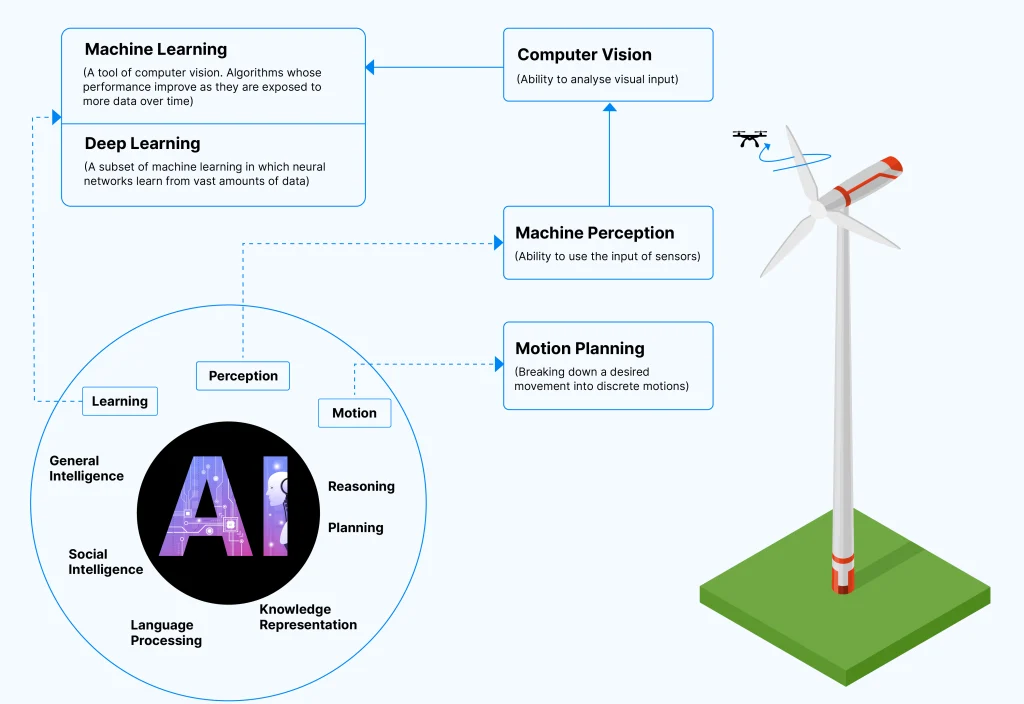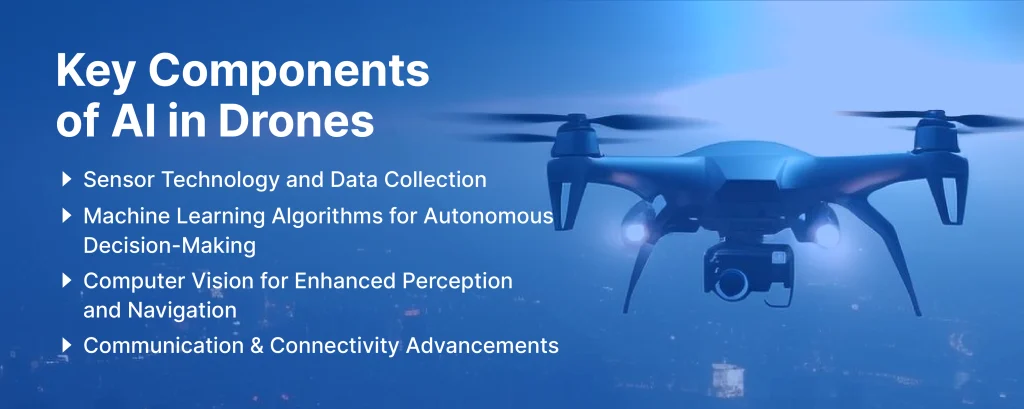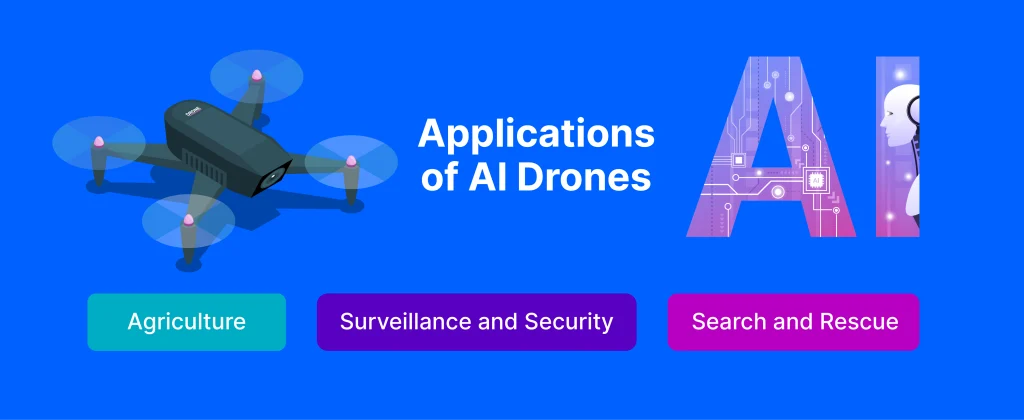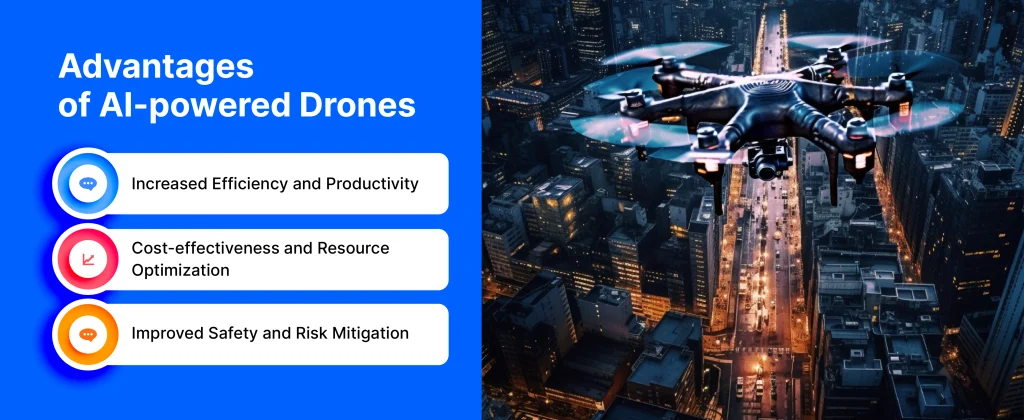When teams operate independently, it creates communication gaps that can lead to disorder. In contrast, when teams collaborate, they tend to be more efficient.
These days, drones are on everyone’s mind, not just because they are entertaining to fly but also because of how they have enhanced contemporary living.
Drones are essential to the daily operations of many organizations and individuals, ranging from product delivery on demand to inspecting disaster areas. However, there are substantial drawbacks to all this technology: the complexity and sophistication of drones increase along with the amount of effort required to build and effectively integrate their functions.
The integration of Artificial Intelligence (AI) in drones marks a revolutionary leap in technological capabilities. This symbiotic relationship brings forth a new era where unmanned aerial vehicles not only navigate through the skies but also possess the cognitive abilities to make intelligent decisions. AI empowers drones with advanced computational capabilities, allowing them to analyze vast amounts of data in real time. This integration facilitates autonomous decision-making, transforming drones from mere flying machines to intelligent agents capable of adapting to dynamic environments. Whether it’s optimizing flight paths, identifying objects, or responding to changing scenarios, AI in drones opens up a myriad of possibilities across diverse industries. From agriculture and surveillance to search and rescue operations, the fusion of AI and drones promises unparalleled efficiency, precision, and innovation, heralding a future where intelligent aerial systems play a pivotal role in shaping our technological landscape.
In the skies above Rwanda, a drone gracefully soars at a speed of 160 kilometers per hour, carrying a vital payload of life-saving blood destined for remote regions amidst the country’s picturesque hills. These unmanned aerial vehicles are meticulously guided by GPS programming, ensuring precise navigation. As the drones approach their designated health centers, an alert is sent via SMS to on-site personnel, prompting them to step outside and retrieve the delivered cargo, gracefully descending via parachute. Remarkably, this innovative system has facilitated over 8,000 successful deliveries within just a little over a year.
The core of drone technology is composed of numerous key components.
Pre-installed with pre-programmed controllers for autonomous flying, cameras, GPS, and navigation systems are common features of drones.
However, the payloads that drones can carry are frequently more important than their ability to fly. These payloads, which may include thermal imaging sensors, LiDar sensors, high-resolution cameras, or anything else, are essentially the brains behind any drone operation.
These aircraft would just be flying machines without them. But the sensors they carry are still essential to getting the information you need. This is where computer vision, as previously mentioned, becomes useful.

From rudimentary military reconnaissance to modern UAVs, trace the evolution of drones through key milestones, showcasing their diverse applications over the years.
Drones, or Unmanned Aerial Vehicles (UAVs), have a rich history dating back to the mid-19th century. The earliest drones were simple, remotely controlled vehicles used for military reconnaissance. Notable milestones include the Kettering Bug, developed during World War I, and the evolution of radio-controlled aircraft in the mid-20th century. As technology advanced, drones became integral in various sectors, from military and surveillance to recreational and commercial applications. The historical trajectory reflects a gradual shift from basic, manually operated devices to sophisticated, autonomous systems, setting the stage for the integration of Artificial Intelligence.
The emergence of Artificial Intelligence in the mid-20th century laid the groundwork for a paradigm shift in technology. Early AI focused on rule-based systems, but it wasn’t until the 21st century that machine learning and neural networks gained prominence. The exponential growth in computing power and the availability of vast datasets propelled AI to new heights. The impact of AI on technology is profound, enabling machines to learn, adapt, and make decisions autonomously. This paradigm shift converges with the evolution of drones, creating a synergy that enhances their capabilities, transforming them into intelligent, self-guided entities with applications across diverse industries.
As Artificial Intelligence (AI) becomes intrinsic to drone technology, understanding its key components is essential to appreciate the transformative capabilities these intelligent aerial systems possess.

The integration of advanced sensors, such as LiDAR, GPS, and cameras, forms the foundation for AI-driven drones. These sensors enable precise data collection, offering insights into the drone’s surroundings and environmental conditions.
Machine learning algorithms empower drones to learn from data patterns, enabling them to make autonomous decisions in real-time. This capability is crucial for adaptive responses to dynamic scenarios, enhancing the overall efficiency and effectiveness of drone operations.
Through computer vision, drones gain the ability to perceive and interpret visual data. This includes object recognition, obstacle avoidance, and improved navigation, contributing to safer and more accurate mission execution.
The integration of cutting-edge communication technologies facilitates seamless connectivity among drones, enabling them to collaborate and share information. This interconnectedness enhances the collective intelligence of drone fleets, optimizing their performance in various applications.
AI-powered drones transcend traditional uses, revolutionizing industries with their advanced capabilities.

Precision Farming and Crop Monitoring AI drones revolutionize agriculture by providing real-time data on crop health, soil conditions, and irrigation needs. This precision allows farmers to optimize resource use, increase yields, and make informed decisions for sustainable farming practices.
Enhanced Monitoring and Threat Detection In the realm of security, AI drones bolster surveillance efforts by autonomously patrolling areas, detecting anomalies, and identifying potential threats. This proactive approach enhances public safety and aids in monitoring critical infrastructures, borders, and disaster-stricken areas.
AI-Assisted Disaster Response AI drones play a crucial role in search and rescue operations, utilizing their ability to navigate challenging terrains and quickly analyze vast areas. Equipped with thermal imaging and sensors, they enhance efficiency in locating and aiding victims during emergencies and natural disasters.
The integration of Artificial Intelligence brings forth a myriad of advantages, propelling drones into new realms of efficiency and effectiveness.

AI-powered drones operate with unparalleled efficiency, executing tasks with precision and speed. Automation of decision-making processes allows for swift and accurate responses, ultimately boosting productivity in various applications, from surveying vast landscapes to delivering packages.
By leveraging AI, drones optimize resource utilization, minimizing operational costs in the long run. Intelligent algorithms enable drones to analyze data, adapt to changing conditions, and make informed decisions, contributing to a more cost-effective and sustainable approach in industries like agriculture, infrastructure inspection, and logistics.
AI-driven drones enhance safety protocols through advanced obstacle avoidance systems and real-time data analysis. These features minimize the risk of accidents and collisions, ensuring safer operations in applications such as surveillance, search and rescue, and industrial inspections. Additionally, the ability to autonomously navigate complex environments contributes to overall risk mitigation. This strategic approach, often encapsulated under the umbrella of risk management, plays a pivotal role in fostering a secure environment and preventing unforeseen challenges.
The integration of AI in drones, while transformative, introduces a spectrum of challenges and ethical considerations that demand scrutiny. Privacy concerns arise as AI drones collect and analyze data, potentially infringing on individual rights. There are apprehensions about the misuse of advanced surveillance capabilities, raising questions about data security and the potential for unauthorized access. Regulatory challenges loom large as authorities grapple with the evolving landscape, seeking to balance innovation with ethical guidelines.
Moreover, the potential for biased decision-making by AI algorithms poses ethical dilemmas, particularly in sensitive applications like law enforcement. As drones become more autonomous, questions surrounding accountability and liability come to the forefront. Striking the right balance between technological advancement and safeguarding societal values requires robust frameworks, transparent policies, and continuous dialogue to ensure the responsible development and deployment of AI-powered drones in our ever-changing world. Addressing these challenges is essential to harness the full potential of this technology while upholding ethical standards and protecting the rights of individuals and communities.
As AI continues to shape the trajectory of drone technology, several exciting trends and innovations are poised to redefine the landscape in the coming years. The continuous evolution of AI algorithms is expected to enhance the cognitive capabilities of drones. Improved learning models, reinforced by ongoing research and development, will empower drones to adapt to even more complex scenarios, leading to heightened decision-making precision and versatility.
The future envisions the utilization of swarming technology, where multiple drones collaborate seamlessly to accomplish tasks efficiently. AI algorithms will facilitate synchronized movements, enabling drone fleets to operate in a coordinated and intelligent manner. This collaborative approach holds promise for applications in disaster response, large-scale surveys, and even artistic displays, showcasing the dynamic potential of AI-driven drone fleets.
These anticipated trends reflect a future where AI and drones work in tandem, pushing the boundaries of what is possible and contributing to innovative solutions in diverse fields. The continuous exploration of these trends will undoubtedly shape the future of AI-powered drones, unlocking new dimensions of efficiency, adaptability, and transformative impact.
Choosing IntellicoWorks for AI development services provides a strategic advantage due to its distinctive features and capabilities. IntellicoWorks boasts a team of seasoned AI experts with a proven track record in developing sophisticated solutions. Their deep understanding of artificial intelligence, machine learning, and data science ensures the delivery of innovative and effective AI applications tailored to your specific needs. IntellicoWorks is committed to understanding the unique requirements of each client. They offer personalized AI development services, tailoring solutions that align with your business objectives, industry standards, and technological preferences.
A new era of technical innovation has been ushered in with the merging of drones and artificial intelligence. Drones with AI capabilities have shown promise to revolutionize a variety of industries, including agriculture, security, logistics, and disaster relief. Drone and AI algorithm development is expected to lead to further innovations and uses that will fundamentally change the way we live. To guarantee that this technology is used responsibly and profitably in the future, it is necessary to address the difficulties and moral dilemmas that come with it. Drones and AI working together is a great technological achievement as well as a significant social responsibility.
Turn Your Ideas into Reality with Our AI Development Services!

Talk to us and let’s build something great together
A Subsidiary of Vaival Technologies, LLC
IntelliCoworks is a leading DevOps, SecOps and DataOps service provider and specializes in delivering tailored solutions using the latest technologies to serve various industries. Our DevOps engineers help companies with the endless process of securing both data and operations.
Ops
Cloud
AI & ML
Copyrights © 2023 byIntellicoworks. All rights reserved.